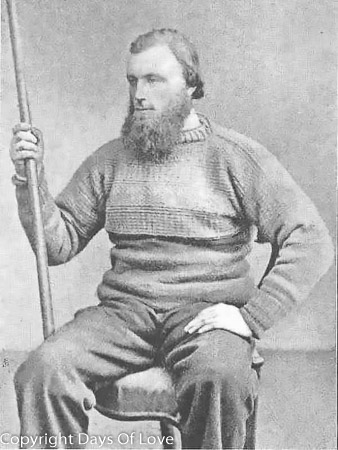Partner Joseph Fletcher
Queer Places:
39 Portland Pl, Marylebone, London W1B 1QQ, UK
7 Southampton Row, Holborn, London WC1B 4AA, UK
19 Charlotte St, Fitzrovia, London W1T, UK
24 Greenberry St, St John's Wood, London NW8, UK
60 Charlotte St, Fitzrovia, London W1T 2NU, UK
Terrace House, 128 Richmond Hill, Richmond TW10 6RN, UK
39 Bolsover St, Fitzrovia, London W1W, UK
60 Lincoln's Inn Fields, Holborn, London WC2A 3JX, UK
17 Old Gloucester St, Holborn, London WC1B, UK
31 Great Portland St, Fitzrovia, London W1W, UK
88 Great Portland St, Fitzrovia, London W1W 7NS, UK
19 King's Parade, Cambridge CB2 1SP, UK
Hall Farm, Stockton Rd, Geldeston, Beccles NR34 0HQ, UK
St Michael, off Scott's Lane, Boulge, Suffolk, IP13 6BW, UK
 Edward
FitzGerald (31 March 1809 – 14 June 1883) was an English poet and writer, best
known as the poet of the first and most famous English translation of The
Rubaiyat of Omar Khayyam. George Warrington in The History of Pendennis
(1848-1850) by William Makepeace Thakeray is partly based on FitzGerald.
Edward
FitzGerald (31 March 1809 – 14 June 1883) was an English poet and writer, best
known as the poet of the first and most famous English translation of The
Rubaiyat of Omar Khayyam. George Warrington in The History of Pendennis
(1848-1850) by William Makepeace Thakeray is partly based on FitzGerald.
Little was known of FitzGerald personally until his close friend and
literary executor W. Aldis Wright, published his three-volume Letters and
Literary Remains in 1889 and the Letters to Fanny Kemble in 1895.
These letters reveal that FitzGerald was a witty, picturesque, and sympathetic
letterwriter.[5]
FitzGerald was unobtrusive personally but by the force of his distinctive
individuality gradually influenced English belles-lettres broadly in
the 1890s.[6]
FitzGerald's emotional life was complex. He was extremely close to many of
his friends; amongst them was William Browne, who was sixteen when they met.
Browne's tragic early death in a horse riding accident was a major catastrophe
for FitzGerald. Later, FitzGerald became close to a fisherman named Joseph
Fletcher, with whom he had bought a herring boat.[3]
FitzGerald grew more and more disenchanted with Christianity, and
eventually ceased to attend church.[7]
This drew the attention of the local pastor, who stopped by. Reportedly,
FitzGerald told the pastor that his decision to absent himself from church
services was the fruit of long and hard meditation. When the pastor protested,
FitzGerald showed him to the door, and said, "Sir, you might have conceived
that a man does not come to my years of life without thinking much of these
things. I believe I may say that I have reflected [on] them fully as much as
yourself. You need not repeat this visit."[7]

19 King's Parade, Cambridge
The 1908 book Edward Fitzgerald and "Posh": Herring Merchants (Including
letters from E. Fitzgerald to J. Fletcher) recounts the friendship of
Fitzgerald with Joseph Fletcher (born
June 1838), nicknamed "Posh", who was still living when James Blyth started
researching for the book.[8]
Posh is also often present in Fitzgerald's letters. Documentary data about the
Fitzgerald-Posh partnership are available at the Port of Lowestoft Research
Society. Posh died at Mutford Union Workshouse, near Lowestoft, on September
7, 1915, at the age of 76.[9]
My published books:


BACK TO HOME PAGE

-
Caufield, Catherine (1981). The Emperor of
the United States and other magnificent British eccentrics. Routledge
and Kegan Paul. p. 86.
ISBN 0-7100-0957-7.
-
"Fitzgerald, Edward (FTST826E)". A Cambridge Alumni Database.
University of Cambridge.
-
"Edward Fitzgerald", PoemHunter
-
Briggs, A.D.P. (1998). The Rubaiyat and the
Bird Parliament. Everyman's Poetry.
- Sendry, Joseph (1984)
"Edward FitzGerald" pp. 121–122 In Fredeman, William E. and Nadel,
Ira B. (editors) (1984) Dictionary of Literary Biography, Volume 32:
Victorian Poets Before 1850 Gale Research Company, Detroit, Michigan,
pp. 118–132,
ISBN 0-8103-1710-9
- Staff (10
April 1909)
"Two Centenaries" New York Times: Saturday Review of Books p.
BR-220
-
Plomer, William (1978). Electric Delights.
David R. Godine. p. 89.
ISBN 0-87923-248-X.
-
Blyth, James (1908).
Edward Fitzgerald and 'Posh', 'herring merchants' Including letters
from E. Fitzgerald to J. Fletcher.
Retrieved 27 December 2017.
-
Fitzgerald, Edward (2014).
The Letters of Edward Fitzgerald, Volume 3: 1867-1876.
Princeton University Press. p. 194.
Retrieved 27 December 2017.
- Decker, Christopher
(editor) (1997) "Introduction: Postscript" Edward FitzGerald, Rubáiyát
of Omar Khayyám: a critical edition University Press of Virginia,
Charlottesville, Virginia,
page xlv,
ISBN 0-8139-1689-5
- Appelbaum, Stanley
(editor) (1990) "Note" Rubaiyat of Omar Khayyam
Dover Publications, Mineola, New York, back cover,
ISBN 0-486-26467-X
- Manchester, Frederick
A. and Giese, William F. (editors)(1926) Harper's anthology for college
courses in composition and literature
Harper & Brothers, New York, volume 2, page 685,
OCLC 1743706 Worldcat.org
- Blake, Victoria
(editor) (1993) "Notes" Selected Stories of O. Henry Barnes & Noble
Books, New York, pages 404 & 418,
ISBN 1-59308-042-5
 Edward
FitzGerald (31 March 1809 – 14 June 1883) was an English poet and writer, best
known as the poet of the first and most famous English translation of The
Rubaiyat of Omar Khayyam. George Warrington in The History of Pendennis
(1848-1850) by William Makepeace Thakeray is partly based on FitzGerald.
Edward
FitzGerald (31 March 1809 – 14 June 1883) was an English poet and writer, best
known as the poet of the first and most famous English translation of The
Rubaiyat of Omar Khayyam. George Warrington in The History of Pendennis
(1848-1850) by William Makepeace Thakeray is partly based on FitzGerald.

